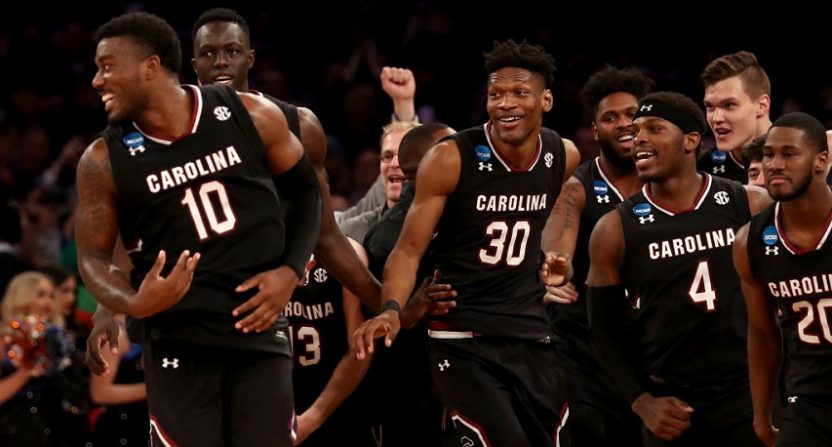Aside from a four-year stretch under Frank McGuire in the 1970s, South Carolina basketball has never had much to brag about.
The Gamecocks’ 2017 NCAA Tournament bid was just its ninth all-time, and when they beat Marquette in the first round, it was their first tournament victory since 1973. South Carolina went from 2005 to 2016 without even making the NCAAs. This year’s 26 wins are already a single-season record for the school.
If you watched the end of the regular season, none of this was supposed to happen.
After starting red-hot, South Carolina cooled off at the worst point of SEC play. They lost five of eight to end the year, then lost again to Alabama in the SEC Tournament to round out a disappointing finish. It seemed like they were tournament-bound, but not by much.
The Gamecocks ended up in by a wide margin, earning a seventh seed. Then they got to work on the best wins they’d earn all season.
A second-half offensive surge buried 10-seed Marquette, then the Gamecocks stunned No. 2-seed Duke. They rolled Baylor by 20 in the Sweet 16. Then up against Florida, who they’d already beaten earlier this year, they gutted another one out. South Carolina was headed to their first Final Four.
It was yet another win for the Palmetto State, which after a history of few major athletic accomplishments, has suddenly become the epicenter for college sports excellence over the past 12 to 15 months.
In January of 2016, Clemson fell just short vs. Alabama, then spent the ensuing fall preparing for the rematch, beating the mighty Crimson Tide for the national championship. Quarterback Deshaun Watson failed to win the Heisman Trophy, but he’ll take his title and a very early selection in April’s NFL Draft.
Despite a slow start to the 2016 college baseball season, Coastal Carolina (located in Conway, S.C.) would rally to finish 53-17 in the regular season. The Chanticleers earned a two-seed, then swept favored LSU in the Super Regional. They spent the College World Series winning games by the skin of their teeth, but eventually beat Arizona two games to one, taking home the national title.
Clemson football players were so excited by the Coastal win (their first team championship in school history) that the entire Tigers team lost their minds when the last out was recorded. State pride is powerful, and right now, South Carolina’s got more of it than most. That doesn’t mean we’ll be seeing Clemson supporting the rival Gamecocks in the Final Four, of course. But the recent attention on the state’s athletic programs certainly stands to benefit all involved.
It’s part of a larger resurgence for the Palmetto State, in general, since 2015. Removing the Confederate flag from the statehouse in 2015 closed a poor chapter in its history. And it also ended up opening a new door as an alternative to intolerant policies passed by its neighbor to the north.
North Carolina’s Public Facilities Privacy & Security Act (commonly known as House Bill 2 or HB2) passed in 2016, and since that moment, has come under scrutiny as highly discriminatory toward the LBGTQ community. The “bathroom bill” bans individuals from using public bathrooms that don’t correspond to their biological sex on their birth certificates – a direct attack on transgender rights.
In response, the NBA moved the 2017 All-Star Game (slated for Charlotte) to New Orleans. The ACC (based in Greensboro, N.C.) and NCAA have moved countless championships that were originally planned to be hosted in North Carolina as well.
Many of those, including some of this year’s early-round NCAA Tournament games (like the Gamecocks’ upset over Duke which took place in Greenville), have been relocated to nearby South Carolina.
The bill, which North Carolina legislators and governor Roy Cooper have agreed to repeal, is estimated to cost the state nearly $4 billion in lost business.
South Carolina stands to benefit from that – though it’s also far from out of the woods with regard to its own similar bill. While the 2016 version died, 2017 will see a renewed fight from those looking to pass that sort of legislation there (and in other states) too.
But for now, 2016-2017 continues the “year of South Carolina sports” for the greater viewing public to witness. The Gamecocks’ run might just end against Gonzaga this Saturday. Or perhaps the surprising stretch continues en route to a championship. A South Carolina vs. North Carolina title game isn’t outside the realm of possibility, either. Maybe then, Clemson would finally put the rivalry aside and cheer for the in-state Gamecocks.
If not, South Carolina’s NCAA Tournament success here is still part of the state’s larger story. Despite a lack of pro teams or the larger cities the Old North State possesses, South Carolina has found a way to potentially surpass its northern neighbor both on and off the field of play. Whether or not that story sticks for good is reliant on more than just college sports championships.



